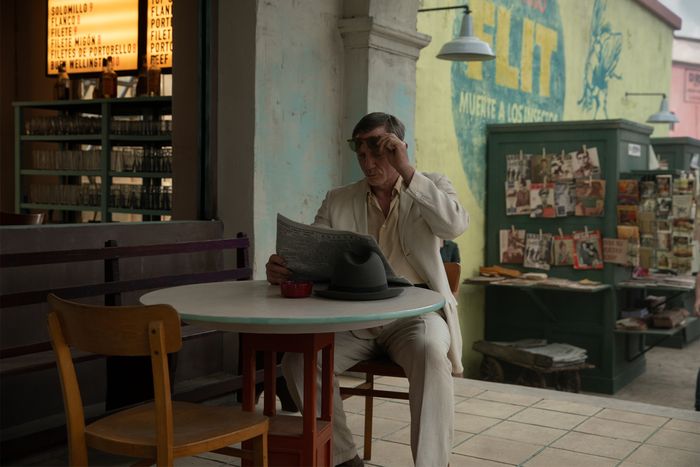
This review was originally published on September 3, 2024 out of the Venice Film Festival. We are recirculating it timed to Queer’s digital release.
It’s curiously fitting that of the two films director Luca Guadagnino has out this year, the queer tennis love triangle one is called Challengers while the challenging William S. Burroughs adaptation is titled Queer. The pair weren’t meant to be an intentional double feature — Challengers was originally slated for a 2023 release until the strike pushed it back — but the two end up functioning as a survey of Guadagnino’s inexhaustible interest in the topic of desire. The earlier film was all about the ways in which love, lust, and intimacy get sublimated into the sport its main characters are obsessed with. And in the new one (also written by Justin Kuritzkes), the yearning is the focus, a force so all-consuming that it sends its main character down to the jungles of Ecuador in search of a drug he hopes will give him telepathic insights into the mind of the object of his obsession. In terms of its eroticism, Queer is so hot to the touch that every scene feels slick with sweat — which makes it all the more perplexing that, emotionally, it feels sealed off. Guadagnino has said that he didn’t want to make a film about unrequited love, but one about love in a more universal and reciprocal sense, but there’s a significant gap between the basic outline of the story he puts on screen and what he’s trying to turn that story into. Queer feels like personal headcanon — you appreciate its creator’s connection to the source material even as it’s a relationship you’re left entirely on the outside of.
Queer is based on a short novel that Burroughs wrote in the early ’50s, while he was awaiting trial for the killing of Joan Vollmer, but which wasn’t published until 1985. It was inspired by his relationship with Adelbert Lewis Marker, who was recently discharged from the Navy and kicking around Mexico City when they met. In the movie, Marker’s stand-in is a character named Eugene Allerton, an elusive beauty embodied memorably by Drew Starkey (of Outer Banks). Burroughs’s fictional equivalent is William Lee, a hard-drinking, grand-standing American expat with independent wealth and a heroin addiction. As played by Daniel Craig, William aims for crispness but is more often a mess, hair damp across his forehead and linen suit crumpled as he stalks from bar to bar prowling for attractive young prospects. It’s not a flattering role, shaded by self-loathing as much as by self-destruction, and marked by the character holding forth about the type of effeminate “subhuman” gay man he was afraid he’d turn out to be. But Craig leans headlong into William’s unstoppable interest in all things bad for him, a category that could certainly include Eugene. Slim in his fitted shirts and pleated pants, flawless as a model, and magically untouched by the heat that gets to everyone else, Eugene glides through William’s favorite bar and into his heart, though the nature of his sexuality is left as unclear as his interest in the man who becomes his dogged though never explicit suitor.
Eugene is unruffled when William and his friend Joe (Jason Schwartzman) talk about sexual escapades, but claims to have never been to an American gay bar himself. He spends long hours with William at bars and at the movies, then leaves to play chess with a woman named Mary (Andra Ursuta) whom he may or may not be involved with. Even after he and William tumble into bed together, he’s as prone to nod to William like a minor acquaintance as he is to come by for a repeat encounter. If, as Guadagnino insists, Queer is not about unrequited love, Eugene’s unavailable nature nevertheless seems key to William’s interest. William insists on framing their relationship as an arrangement in which he pays for them both to travel through South America, and in exchange Eugene will “be nice” to him twice a week. After a bout of what sure looked like mutually enjoyed sex (none of Call Me By Your Name’s cutting away here), William timidly asks his lover “Do you not mind this terribly?” He’s clingy with Eugene, but also relies on this self-created distance, while what’s on Eugene’s mind remains so unknowable that William starts fixating on getting to Ecuador to try a drug he’d read has telepathy-enhancing qualities — one he refers to as yage until he meets a possible purveyor and brings up another name it’s known by.
Men will literally trudge through the jungle to get Lesley Manville to give them ayahuasca instead of going to therapy, etc. They’ll also roam the streets of a soundstage-looking Mexico City to the sound of Nirvana (one of several lusciously anachronistic soundtrack moments). They’ll imagine touching the man they want to be with so intensely that a ghostly version of them will actually unhook from their body onscreen to complete the movement. They’ll have brief encounters with filmmakers Lisandro Alonso, David Lowery, and Ariel Schulman in what are essentially cameo roles. And they’ll merge in a psychedelic vision of intimacy that takes as much from body horror as it does from a more romantic connection. The stylistic choices Guadagnino makes throughout Queer are invariably more engaging than the central story itself, no matter what the filmmaker tries unsuccessfully to will it into. Like many people, Guadagnino first encountered Burroughs’s writing when he was a teenager, and Queer does feel like someone trying on a beloved article of clothing from high school that no longer really fits. It’s an awkward combination of fidelity to historical research and wish fulfillment that doesn’t serve anyone except its creator.
More Movie Reviews
- The Accountant 2 Can Not Be Taken Seriously
- Another Simple Favor Is So Fun, Until It Gets So Dumb
- Errol Morris Has Been Sucked Into the Gaping Maw of True Crime


